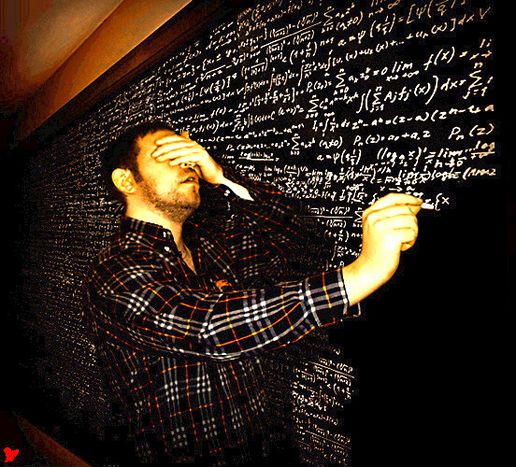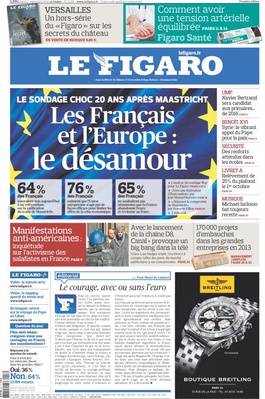
Surveys suck: 'In 2012, the French would vote against Maastricht treaty '
Published on
Translation by:
 Isobel Royce
Isobel Royce
Desamour! On 17 September French newspaper Le Figaro published an article entitled ‘The French and Europe: The End of the Romance’ about ‘a shocking IFOP survey’. 20 years after the ratification of the Maastricht treaty, 64% of French people say they would vote against the agreement which made provisions for creating the single currency
64%: the statistic sounds ‘a warning note’ of euroscepticism in France. But on the same page the daily paper shows that, ‘65% of the French nevertheless do not want to abandon the euro and return to the franc.’ So what’s the solution? If you can't have the euro, you can't have the franc either - maybe the Sol-Violette, a system of alternative local currencies, would be more acceptable?
Excitement of the unknown
 Le Monde adopts a positive tone when highlighting that in this survey, 67% of those questioned generally think that the EU is heading in the wrong direction. Le Figaro says more Germans are ‘even more sceptical than the French’. In effect the statistics back each other up. According to a 2012 study undertaken by the Bertelsmann foundation, 65% of Germans feel that they would be personally better off if the country had kept the Deutschmark, rather than the euro.
Le Monde adopts a positive tone when highlighting that in this survey, 67% of those questioned generally think that the EU is heading in the wrong direction. Le Figaro says more Germans are ‘even more sceptical than the French’. In effect the statistics back each other up. According to a 2012 study undertaken by the Bertelsmann foundation, 65% of Germans feel that they would be personally better off if the country had kept the Deutschmark, rather than the euro.
'Waaas?' The Germans, these paragons of correctness who are almost as mathematical as the statistics themselves, these navigators of the economic waters, would they really be ready to abandon ship, the baby and the bathwater? Not exactly. From the same study we learn that a little more that half of the Germans (52%) in fact personally believe that belonging to the EU confers benefits, whilst only a third (32%) rather regard it as bringing disadvantages. Don’t hold back children! Paradoxically, the Bertelsmann foundation informs us that the French (and the Polish, as well) recognise the protective role of the EU and that it promotes social cohesion. Perhaps the title of the original Le Monde article should be: ‘The French and Europe: In Love?’, rather than ‘The French and Europe: The End of the Romance’.
‘Surveys allow people to know what they think’
As with the studies mentioned above, people take what they are interested in to show what they want to show. You may tell us that this is is truism, but it is being used once more, to underline the pretence and absurdity of a recipe which has the single aim of cooking up the facts. Why is Le Figaro’s survey a ‘warning note’? The level of alert was already red before today, right? How can this survey be called ‘shocking’? The statistics have merely quantified views which appeared more than four years ago, presenting them as a cataclysm. The book Opinion Poll Madness ('L’Ivresse des sondages') produces ample ammunition for the media which loves the excitement of the unknown. ‘Surveys allows people to know what they think’, said the late French comedian Coluche. Personally, we prefer statistics when it’s a matter of choosing between large or small squares in a notebook.
Images: main (cc) mikeyangels/ flickr (official site); in-text © courtesy of the website revue2presse.fr
Translated from Euroscepticisme : des chiffres et de l'air


